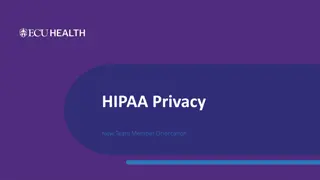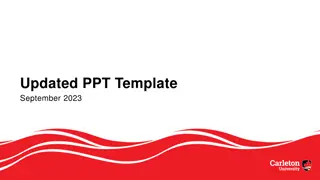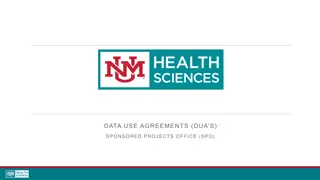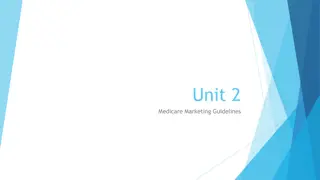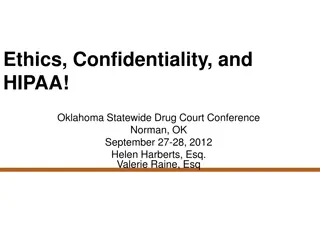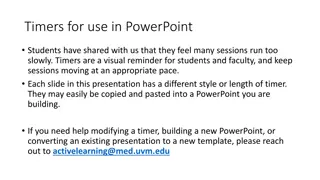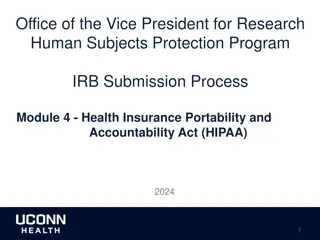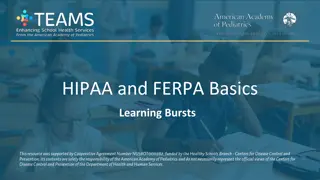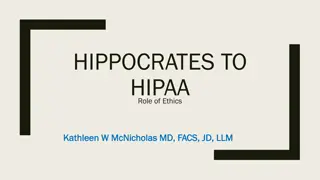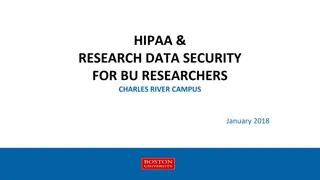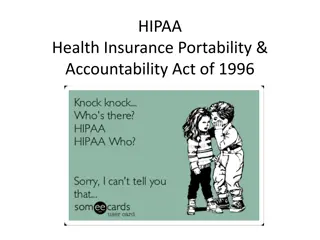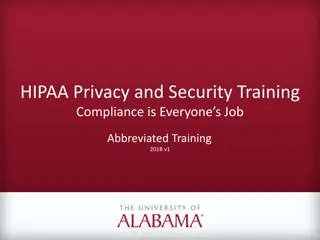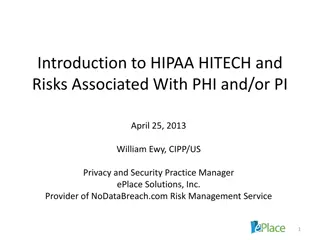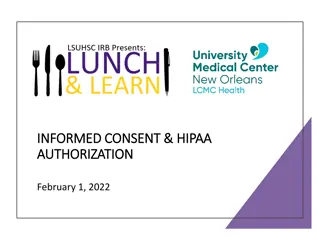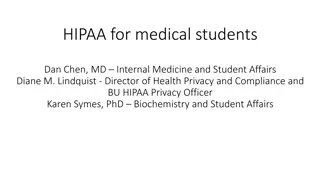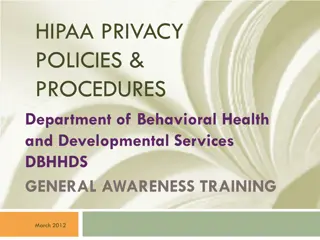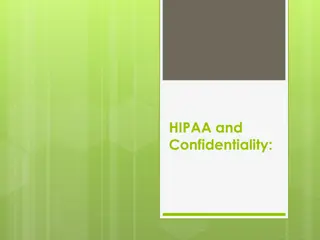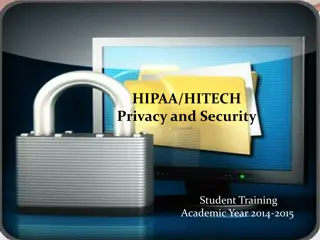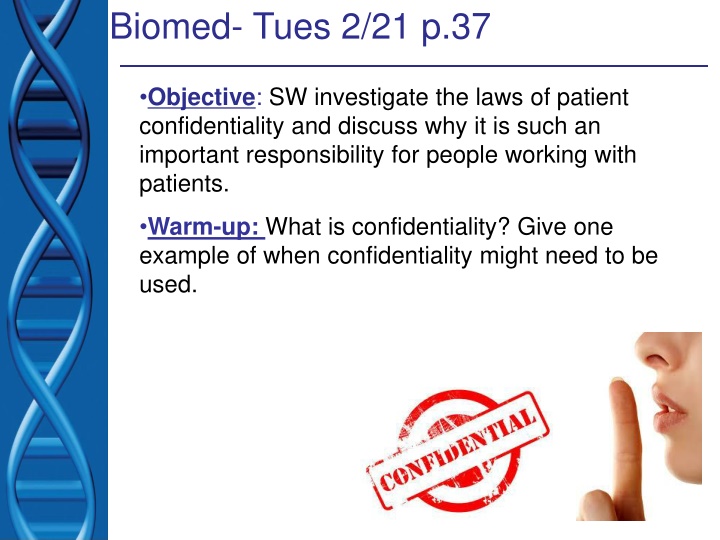
Importance of Patient Confidentiality in Healthcare
Learn about the laws and guidelines of patient confidentiality, with a focus on HIPAA regulations. Explore why maintaining confidentiality is crucial for healthcare professionals when handling sensitive patient information. Discover the protected health information under HIPAA and the responsibilities involved in safeguarding patient privacy.
Download Presentation

Please find below an Image/Link to download the presentation.
The content on the website is provided AS IS for your information and personal use only. It may not be sold, licensed, or shared on other websites without obtaining consent from the author. If you encounter any issues during the download, it is possible that the publisher has removed the file from their server.
You are allowed to download the files provided on this website for personal or commercial use, subject to the condition that they are used lawfully. All files are the property of their respective owners.
The content on the website is provided AS IS for your information and personal use only. It may not be sold, licensed, or shared on other websites without obtaining consent from the author.
E N D
Presentation Transcript
Biomed- Tues 2/21 p.37 Objective: SW investigate the laws of patient confidentiality and discuss why it is such an important responsibility for people working with patients. Warm-up: What is confidentiality? Give one example of when confidentiality might need to be used.
Agenda: 1. HIPAA presentation 2. Activity 1.3.2 confidentiality
Table of Contents Name of Assignment 1.2.3 DNA analysis & paper gel 29-30 Gel Electrophoresis Virtual lab 31 Body system matching 32 Activity 1.3.1 Autopsy 33 Activity 1.3.1 Autopsy report 34 Week # 5 warm-ups 35 1.3.3 was it a crime 36 Week #6 warm-ups 37 1.3.2 Confidentiality 38 1.3.2 student response sheet 39 Date Page # 2/7 2/7 2/9 2/9 2/9 2/13 2/13 2/21 2/21 2/21
Health Insurance Portability and Accountability Act (HIPAA)
WHAT IS HIPAA? HIPAA is a law adopted in 1996 to provide standards for health care related electronic transactions HIPAA mandates federal privacy protections for certain individually identifiable health information, covered under the HIPAA Privacy Rule
HIPAA PRIVACY RULE Regulates how medical professionals and other people use and disclose certain individually identifiable health information Called protected health information (PHI)
WHAT INFORMATION IS PROTECTED? Individually identifiable health information must be kept confidential, including demographic data that relates to: The individual s name, address, birth date, social security number, etc. The individual s past, present, or future physical or mental health or condition The health care services provided to the individual The past, present, or future payment for health care services provided to the individual
MAINTAINING CONFIDENTIALITY Professionals are to take all precautions necessary to keep all individually identifiable health information confidential. Professionals are not to speak about patients with any identifiable information with anyone other than other professionals working with the patient. Patient records should not be left in public space unattended, where they are easily accessible to unauthorized people.
MAINTAINING CONFIDENTIALITY Professionals must make reasonable efforts to avoid being overheard and reasonably limit shared information. Professionals may disclose protected health information to a family member or other person involved when the individual is present during the disclosure. Professionals are permitted to communicate with patients regarding their health care, including through the mail or by the phone. Messages may be left with family members, on voice mail, etc. with patient consent.
WHEN HEALTH INFORMATION CAN BE SHARED Providing information needed for payment of benefits or health coverage Disclosing information to specific agencies as required by public health laws for the purpose of: Controlling infectious disease Preventing injury Preventing child abuse, neglect, or domestic violence Preventing any serious threat to public health or safety Complying with workmen s compensation laws
WHEN HEALTH INFORMATION CAN BE SHARED Providing information for legal proceedings Providing law enforcement agencies with information to locate or apprehend fugitives and to identify victims or missing persons Assisting a person who has been designated as your legal representative if you are unable to make medical decisions on your own (such as if you are under the age of 18)
WHEN HEALTH INFORMATION CAN BE SHARED Assisting an official agency in the event of a disaster relief effort to notify family members of your condition, status, and location Assisting coroners or medical examiners to identify a deceased person, determine the cause of death, and perform other functions authorized by law
DIRECTIONS Work in your groups to read through each scenario. For each scenario decide whether or not you believe HIPAA was violated. Use your notes from the presentation to help you make your determination and defend your choice. Record your answers in the appropriate spaces on the Student Response Sheet. You need to be an expert on the scenario that corresponds to your group number Discuss each scenario as a class. After discussing each scenario, your teacher will share whether or not HIPAA was technically violated.
SCENARIOS Scenario 1 A 32 year old immigrant from a patriarchal country is giving birth. As she is delivering the baby, she tearfully confesses to her doctor that this is her 4th child and she simply cannot handle any more children. She tells the doctor that her husband refuses to use contraception or allow her to, and she begs her doctor to tie her tubes and not tell her husband. The doctor complies. Was HIPAA Violated? Why or why not?
Scenario 2 A physical therapist and a nurse are riding in the elevator together. During their ride they loudly discuss a patient they both have had for some time now. The elevator is full of people who can all hear them refer to the patient by name. Was HIPAA Violated? Why or why not?
Scenario 3 A mother emailed her son s teacher about his history of seizures. Months later, the teacher replied to the email to tell the mother about discipline problems. Communication eventually became very hostile. The teacher forwarded the conversation to her best friend, a teacher at the same school. The teacher s friend does not have this boy in her class. The information about the boy s seizures was at the very bottom of the email strand. Was HIPAA Violated? Why or why not?
Scenario 4 A 33 year old woman visited her doctor for a routine check-up. The doctor called back a week later to report the lab results. The husband answered the phone, and the doctor shared the results with the husband. Was HIPAA Violated? Why or why not?
Scenario 5 A teacher decides that he needs to attend an in-patient drug rehabilitation program. He tells his employer that he needs time off for medical reasons. The employer requires a FMLA (Family Medical Leave Act) form from the employee s doctor. The doctor fills it out, including information about the patient s history with drug use. Was HIPAA Violated? Why or why not?
Scenario 6 Two nurses are shopping together after work. As they walk around, they talk about their patient Barbara. Although she s in the hospital for diabetes treatment, they discuss the fact that her crazy bug-eyes means she probably has an overactive thyroid (Graves disease). They wonder aloud whether to tell Barbara their suspicions. Was HIPAA Violated? Why or why not?
Scenario 7 Two doctors are having a private lunch together in the physician dining room, which is empty. As they eat they talk about the man with the terrible abscesses that they recently treated. They joke about how bad they smelled and about the fact that the juice that squirted out when they punctured one of the abscesses hit the nurse right in the face. Was HIPAA Violated? Why or why not?
Scenario 8 A 14-year-old freshman is pregnant and visits her OB/GYN. Her mother comes with her and comes into the doctor s office for the visit. She asks the doctor many questions about the due date, the heart rate of the baby, methods of delivery, genetic risks, etc. The doctor answers all of the mother s questions. Was HIPAA Violated? Why or why not?
Scenario 9 At the age of 35, Anna Garcia is diagnosed with the H1N1 flu (also known as the swine flu). She is hospitalized with severe symptoms but recovered with no problems. Her doctor reports her illness to the local department of public health. Was HIPAA Violated? Why or why not?

